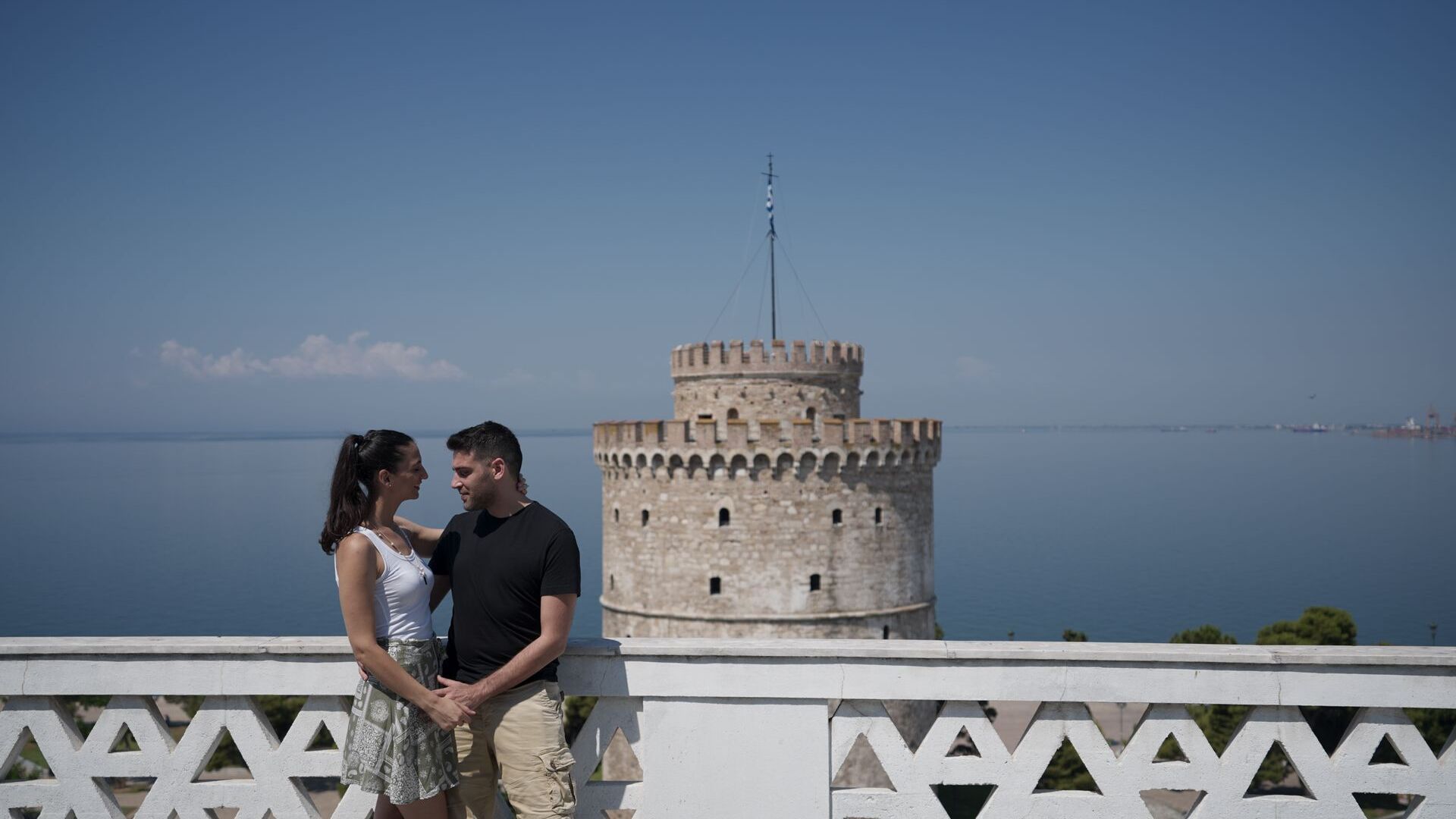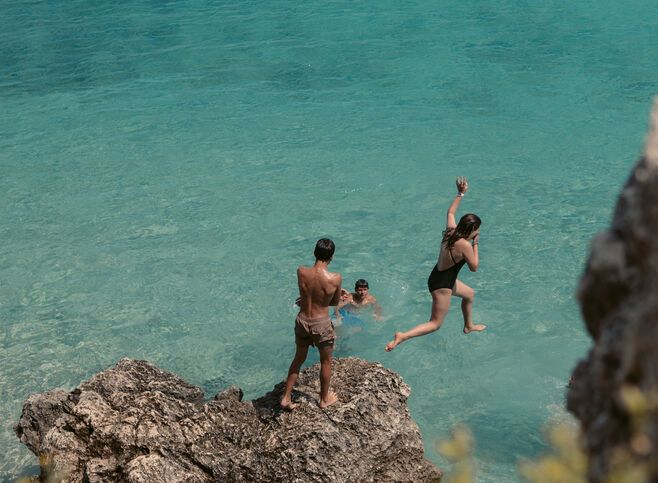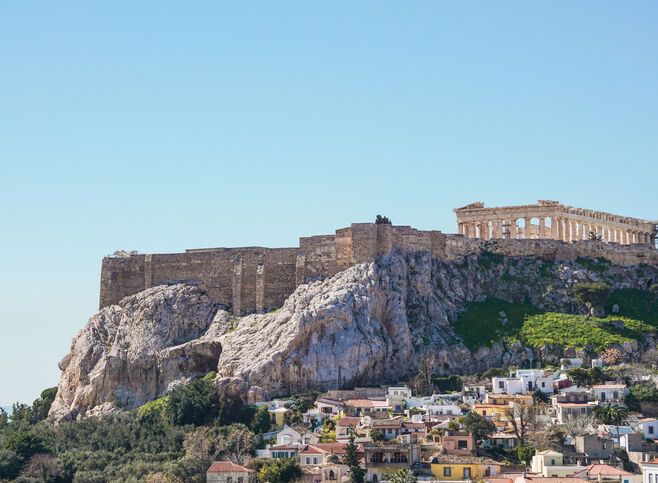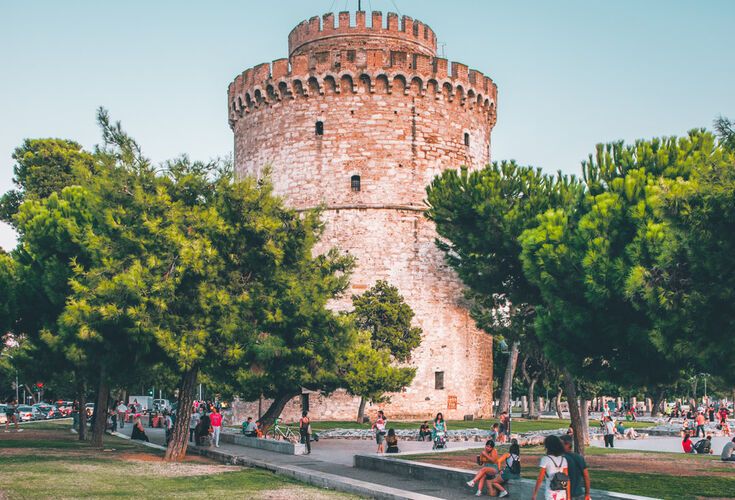- Places to go
- Things to do
- Book your trip
- Get Inspired
- More
- BACK
-
-
Greece’s second city is unlike anywhere else in the country. Thessaloniki is both a sprawling urban centre and a cultural melting pot, where dreams, ideas, visions and trends percolate in an alternative, avant-garde scene. Its history is written upon everything that surrounds you, with ancient monuments (Greek and Roman) found amongst buildings that tell the story of the city’s more recent Byzantine, Ottoman and Jewish influences.
It has become one of Europe’s coolest city break destinations (welcoming flights to its international airport throughout the year) with a well-earned reputation for food and nightlife and a colourful arts & culture scene. Galleries and museums, international cinema and arts festivals, traditional tavernas, gourmet restaurants and street food as well as exhibition and conference centres … you’ll find it all. And above all, you’ll get a Thessaloniki-sized, warm-hearted welcome from the locals.
Thessaloniki is, above all, a city made to be strolled. A walking tour of Thessaloniki allows you to trace the civilisations and people that have left their mark. The Palace, Triumphal Arch and Rotunda (which formed the city’s administrative and religious centre during the reign of Emperor Galerius Maximilianos in the early 4th century AD) are the preeminent legacy of Roman times. Meanwhile, the Jewish Museum recreates the life of the Jewish community in pre-war Salonica. And don’t forget to visit the former home of Kemal Ataturk, founder of modern Turkey, an architectural reminder of the Ottoman occupation.
In the White Tower (one of the symbols of Thessaloniki) by the waterfront, you’ll enjoy an interactive museum tour, with each floor dedicated to a different face of the city – cultural, commercial, culinary and intellectual – before emerging on the rooftop and being treated to a 360-degree view of the Thermaic Gulf and the city landscape.
And in the Archaeological Museum of Thessaloniki, you’ll explore the extraordinary breadth of the region’s Macedonian culture, with artefacts such as the Petralona Hoard (a collection of bronze tools dating from the 3rd millennium BC) and the gold wreaths for which the Macedonians were famed.
Thessaloniki is small enough to walk from Aristotelous Square in the centre to the Upper Town (alternatively take a taxi or bus). Once there, spend as long as you like exploring the narrow lanes of one of the oldest districts of Thessaloniki. It is home to Venetian castles (the Trigoniou Tower and Eptapyrgio fortifications) as well as more Ottoman monuments, the Vlatades Monastery and the Byzantine churches of Osios David and Agios Nikolaos Orfanos. It is the best-preserved district of the old city, with views across the sea and (on clear days) to Mt Olympus.
Best day trips from Thessaloniki
Window shopping on Tsimiski Street, bar-hopping on Valaoritou Avenue, attending the International Film Festival in one of the warehouses of the port, listening to live music in the Ladadika district or walking through the vaulted arches and open-air markets… there are so many things do to in Thessaloniki that you’ll quickly understand why it’s a city that wears its heart on its sleeve.
There’s a youthful energy, day and night, with hidden treasure around every corner: historic cafes, cosy bars and clubs with impressive designs in renovated industrial spaces that host live rock concerts. Thessaloniki’s nightlife is legendary in Greece. If in doubt, follow the locals to their favourite haunts. There’s something for all styles and tastes.
Leaving Thessaloniki, you’ll take with you thousands of memories and a few (worthwhile) grams of weight. High-end restaurants and trendy dining options, as well as out-of-the-way ouzeries, tavernas and all-day restaurants have made Thessaloniki a renowned foodie destination in Greece. Istanbul and Pontos, the Balkans and the Mediterranean, Macedonia and Thrace… all these cultures will make their way onto your plate.
Thessaloniki’s cuisine is known for its meze (small plates intended for sharing) and recipes that the 1920s refugees brought from Asia Minor. They also brought the tradition of patsa (tripe soup) and Thessaloniki’s famous bougatsa (a sweet-cream breakfast pastry that can be eaten at any time of day).
The last of your experiences in Thessaloniki isn’t in Thessaloniki at all. As Greece’s main city in the north, it’s perfectly situated for excursions into the countryside, from the beaches of Halkidiki (you can be in Kassandra, the first of Halkidiki’s three peninsula ‘fingers’, in just over 1hr) to the Royal Tombs of Vergina (the burial site of Philip II of Macedon, father of Alexander the Great) an hour to the west. Other archaeological sites within striking distance include Pella, Philippi and Ancient Dion and you can go wine tasting on a tour of the vineyards around Thessaloniki. To the south, you’ll find it hard to resist the feast of activities on Mt Olympus or you could discover other little-known but utterly beautiful areas of Greece, like the Axios River Delta in Thrace, one of Europe’s richest wetlands with around 300 bird species living permanently or migrating through the area.
There are multiple ways to reach Thessaloniki, making it ideal for getaways throughout the year. It has an airport with international and domestic flights and is connected to Athens by the Greek National Highway (A1) (500km, 5hr15min by car). There are also land entry points between Greece and Bulgaria at the Promachonas border station (111km, 1hr25min from Thessaloniki), Turkey at the Kipi border station (337km, 3hr20min) and North Macedonia at the Evzoni border station (81km, 1hr5min). Finally, there are regular connections from Athens to Thessaloniki by public bus (KTEL) and train (more info here).
Thessaloniki airport is 18km from the city centre (30min by car) and there are regular bus services (more information here).
Thessaloniki is worth visiting all year round, with every season offering something different. Spring and autumn are the most comfortable seasons for walking around the city and exploring the countryside (with lower temperatures and fewer people). In summer, you can combine your visit to Thessaloniki with trips to the beach and the festive spirit at Christmas is one of the best in Greece.
Thessaloniki is famous for its warm and generous locals and love of life, with creativity and great food found all around the city. It is known as Greece’s most multicultural city, with Byzantine and Ottoman influences, as well as the influence of Greeks who returned from Asia Miner after the 1922 population exchange with Turkey. It also once had a large Jewish community. There are many museums and cultural sites and one of the best nightlife scenes in Greece.




















